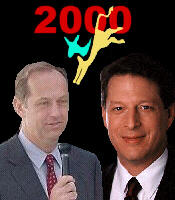 |


NGLTF's Policy Institute Analyzes Parties' Stands Republicans, Says first Report, are Primarily Anti-Gay |
|
Compiled By GayToday
It relies on public statements, voting records and other means of gauging candidates' records on GLBT issues. The report is the first in a continuing series of analytical pieces on electoral politics the NGLTF Policy Institute will publish between now and the November 2000 election. The Policy Institute is a think-tank based in New York dedicated to research, policy analysis, strategy development and coalition building to advance the equality and understanding of gay, lesbian, bisexual and transgender (GLBT) people. NGLTF Executive Director Kerry Lobel noted that many political reporters and editorial writers recently have cast the Republican Party in a favorable light in the GOP's handling of GLBT issues, a conclusion that is not warranted or supported by the NGLTF Policy Institute's report.
"A review of the positions of the presidential candidates on issues of concern to gay, lesbian, bisexual and transgender voters reveals that stark choices face GLBT voters in the year 2000 election," the report found. "On one side of the spectrum are candidates who are deeply hostile to GLBT equality. On the other side are candidates who strongly support GLBT freedom, and arrayed in the middle are those who position themselves to appeal to both sides." The report also explains what is at stake in the year 2000 elections. The stakes include two or more Supreme Court nominees; the fate of a number of GLBT civil rights measures; federal emphasis (or lack thereof) on HIV/AIDS prevention; and a range of other issues that affect GLBT people, ranging from affirmative action to immigration policy. "And for GLBT families, seniors, youth and taxpayers, the devolution of policy-making authority from Washington to state and local governments holds both great promise and potential danger," the report states. "Even with devolution of decision-making power, the federal government still sets the parameters of what is possible." The report unveiled several important trends for supporters of GLBT equality to consider when they cast ballots in the year 2000 elections: Anti-GLBT positions are still widely held by most candidates. Increasingly, as the differences between liberals and conservatives on economic and foreign policy issues become blurred, candidates' positions on GLBT rights come to be seen as markers of moderation or extremism. The homophobia displayed by most candidates stands in sharp contrast to the views and values shared by growing majorities of the American public. For instance, while not a single Republican presidential candidate has endorsed the Employment Non-Discrimination Act, more than 80 percent of Americans support equality in employment and housing, regardless of sexual orientation. The candidates' views on GLBT equality span a gamut that is perhaps wider than ever before. On the one hand, Democrats Bill Bradley and Al Gore tend to be generally supportive of GLBT equality. On the other hand, a majority of Republican candidates go out of their way to attack GLBT people, including signing a homophobic pledge on the eve of the Iowa Straw Poll last month. Even those candidates perceived in some circles as being moderate, such as George W. Bush, in reality have abysmal records on GLBT issues. Several candidates are actively promoting their support for gay rights or at least inclusion of gay and lesbian party activists, voters and appointees, because such positions are viewed as an asset, not a liability. Gay, lesbian and bisexual (GLB) voters are an increasingly significant piece of the electorate. Voters who self-identify as gay, lesbian or bisexual increased from 2.2 percent in 1992 to 5 percent in 1996 and 4.2 percent in the mid-term elections of 1998. This is larger than several key voting blocs, and can be a key swing vote in a close election; one-third of GLB voters supported Republicans in 1998.
Courting the Vote: The 2000 Presidential Candidates' Positions on Gay, Lesbian, Bisexual and Transgender Issues was researched and written by Sean Cahill and Erik Ludwig of the NGLTF Policy Institute. Copies of the 44-page report may be obtained by calling the NGLTF Communications Department at 202-332-6483. |



